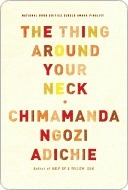More on this book
Community
Kindle Notes & Highlights
I often want to tell Nkiru that her mother visits weekly in the harmattan and less often during the rainy season, but if I do, she will finally have reason to come here and bundle me back with her to America and I will be forced to live a life cushioned by so much convenience that it is sterile. A life littered with what we call “opportunities.” A life that is not for me.
“Is it a good life, Daddy?” Nkiru has taken to asking lately on the phone, with that faint, vaguely troubling American accent. It is not good or bad, I tell her, it is simply mine. And that is what matters.
She had come to understand that American parenting was a juggling of anxieties, and that it came with having too much food: a sated belly gave Americans time to worry that their child might have a rare disease that they had just read about, made them think they had the right to protect their child from disappointment and want and failure. A sated belly gave Americans the luxury of praising themselves for being good parents, as if caring for one’s child were the exception rather than the rule.
She said nothing, because it was not where they lived that mattered to her, it was what they had become.
a mixture of ignorance and arrogance, he called it. Then he told you how the neighbors said, a few months after he moved into his house, that the squirrels had started to disappear. They had heard that Africans ate all kinds of wild animals.
white people who liked Africa too much and those who liked Africa too little were the same—condescending.
You did not know that people could simply choose not to go to school, that people could dictate to life. You were used to accepting what life gave, writing down what life dictated.
You did not want him to go to Nigeria, to add it to the list of countries where he went to gawk at the lives of poor people who could never gawk back at his life.
She wanted to interrupt and tell him how unnecessary it was, this bloodying and binding, this turning faith into a pugilistic exercise; to tell him that life was a struggle with ourselves more than with a spear-wielding Satan; that belief was a choice for our conscience always to be sharpened. But she did not say these words, because they would sound sanctimonious coming from her; she would not be able to give them that redeeming matter-of-fact dryness as Father Patrick so easily did.
The choir had begun to sing. It was one of those Sundays when the priest blessed the congregation with holy water at the beginning of Mass, and Father Patrick was walking up and down, flicking water on the people with something that looked like a big saltshaker. Ukamaka watched him and thought how much more subdued Catholic Masses were in America; how in Nigeria it would have been a vibrant green branch from a mango tree that the priest would dip in a bucket of holy water held by a hurrying, sweating Mass-server; how he would have stridden up and down, splashing and swirling, holy water
...more


